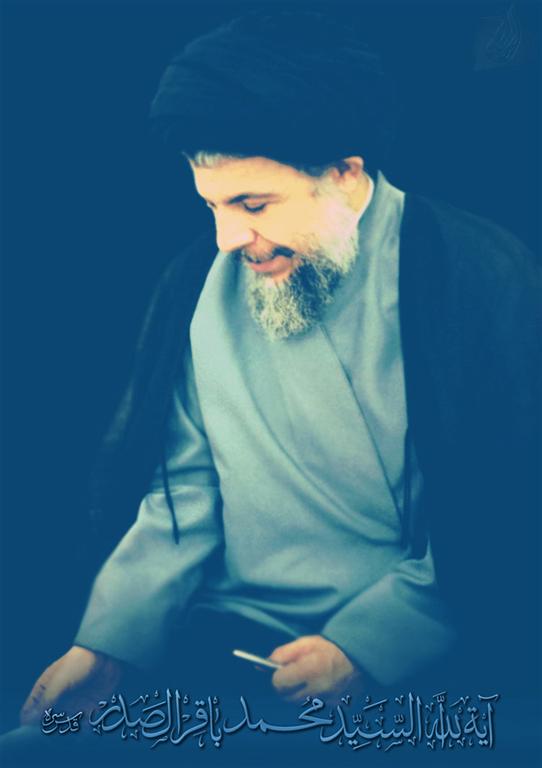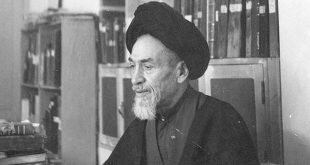Martyr Ayatollah Muhammad Baqir al-Sadr (March 1, 1935 – April 9, 1980) was a notable Shia cleric, philosopher, and ideological founder of the Iraq Islamic Dawa Party.
Late Sayyed Muhammad-Baqir al-Sadr was a member of a distinguished Iraqi family with a genealogy that is traced back directly to the Prophet of Islam, Muhammad, hence his title of “Sayyed.” He was born on March 1, 1935 in the holy city of al-Kadhimiyya, northwestern Baghdad in the Karkh flank, and was assassinated by Saddam’s regime on April 9, 1980 together with his sister, Amina al-Sadr, who is better known by her pen name “Bint al-Huda” (daughter of guidance), a novelist, poetess, writer and social organizer as well as defender of women’s rights. His ancestors had lived in the region of Jabal Amil in present-day southern Lebanon. In recent Iraqi history, one of the family numbers, another Muhammad al-Sadr, served as Iraq’s prime minister in 1948. Al-Sadr’s father, Muhammad Sadiq, was a mujtahids, a theologian qualified to make independent juridical decisions, and his grandfather and great-grandfather were among the highest religious authorities (maraji`; sing. marji` ) of their time. His mother was the daughter of late Grand Ayatollah Shaykh Muhammad Rida Āl-YaSin, also a prominent marji`. Muhammad al-Sadr was educated at Najaf’s hawza, theological seminary. In his advanced studies, known as dars al-kharij, he was taught by scholars such as then Grand Ayatollah Abul-Qasim al-Khoei and Sayyed Ruhollah Khomeini. He became mujtahid in the mid-1970s, and in the early 1990s he published his own collection of fatwas (edicts) in jurisprudence known as the risala amaliyya which he called al-Sirat al-Mustaqim, “the Straight Path”, thereby signaling his wish to be recognized as a marji` taqlid , an authority for religious emulation.
Early Life and Education
Martyr al-Sadr was born into the Sadr family. This family is Kadhimi by descent, that is, its lineage is traced back to Imam Mousa al-Kadhim (128 – 183 A.H./745 – 799 A.D.), one of the offspring of the Prophet of Islam through his daughter, Fatima, and cousin Ali. He was born, as noted above, in the holy city of al-Kadhimiyya where Imams Muhammad al-Jawad (also titled al-Taqi), who was born in Medina, Hijaz, on Rajab 10, 195 A.H. and was martyred in Baghdad on Thul-Qi`da 29, 220 A.H., corresponding to April 8, 811 – November 24, 835 A.D., and Imam Mousa al-Kadhim, peace with them both, are buried in a magnificent Shrine. At the age of 10, he went to the holy city of Najaf to study language, logic and theology. Martyr al-Sadr suffered the pain of being an orphan, having lost his father at the age of two. In those times, it is uncertain if his father was also martyred.  We do not have much information about how he passed away, but regardless, his death in 1937 left Martyr al-Sadr an orphan under the care of some great scholars of the time from his well known Sadr family. Haider al-Sadr was the name of the father of Martyr al-Sadr. He was considered among the most pious people. Martyr al-Sadr studied under various teachers in Najaf. Among his teachers were Grand Ayatollah Sayyed Abul Qasim al-Khoei and Grand Ayatollah Muhsin al-Hakim. At the age of 25, he himself started teaching at the level of Ijtihad, truly a great achievement if only you know how high this religious degree is and what is required to earn it! Not only was he a mujtahid, he was teaching other scholars to become mujtahids as well and at such a young age. Basically, at the age that most students become capable of attending dars al-kharij, Martyr al-Sadr was teaching it! He wrote Our Philosophy, which we will talk about a little later, at the age of 24 as did Imam Khomeini who wrote his book Forty Ahadith at the age of 24!
We do not have much information about how he passed away, but regardless, his death in 1937 left Martyr al-Sadr an orphan under the care of some great scholars of the time from his well known Sadr family. Haider al-Sadr was the name of the father of Martyr al-Sadr. He was considered among the most pious people. Martyr al-Sadr studied under various teachers in Najaf. Among his teachers were Grand Ayatollah Sayyed Abul Qasim al-Khoei and Grand Ayatollah Muhsin al-Hakim. At the age of 25, he himself started teaching at the level of Ijtihad, truly a great achievement if only you know how high this religious degree is and what is required to earn it! Not only was he a mujtahid, he was teaching other scholars to become mujtahids as well and at such a young age. Basically, at the age that most students become capable of attending dars al-kharij, Martyr al-Sadr was teaching it! He wrote Our Philosophy, which we will talk about a little later, at the age of 24 as did Imam Khomeini who wrote his book Forty Ahadith at the age of 24!
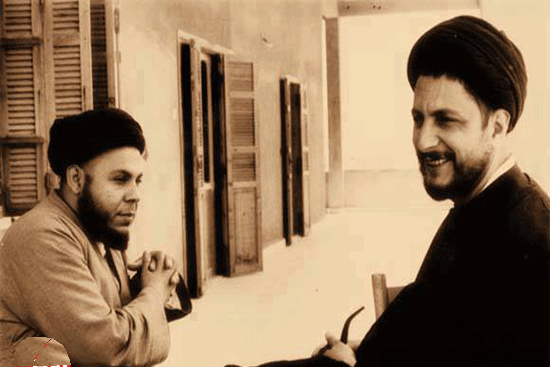
Martyr al-Sadr was also, in some sense, lucky to have some great students. In a very short period of time, he raised some great scholars under his tutelage. He raised scholars who became world renowned for their intellectual and political achievements. Martyr Sayyed Muhammad-Baqir al-Hakim was among Martyr al-Sadr’s students. Sayyed Kadhim Haeiri, who is considered among the top scholars of Iraq, was also among his students. Another of his students was Sayyed Kamal al-Haideri, who is now considered to be among the great teachers of the hawza . Sayyed Kamal al-Haideri once said that a panel of university teachers came to Grand Ayatollah al-Khoei and told him that the education system at the hawza was not strong. Ayatollah al-Khoei asked them if their university has a better, more effective system. They said that, “We graduated PhDs from our university.” Sayyed al-Khoei asked how many they were. They said that even if it had been a single Ph.D. graduate, it would have been enough for their university. In response, Sayyed al-Khoei said, “I will introduce you to one of my students. You may invite all your Ph.D. graduates to ask him about any field that they feel they have expertise in.” Without any hesitation, Sayyed al-Khoei summoned young al-Sadr to his presence.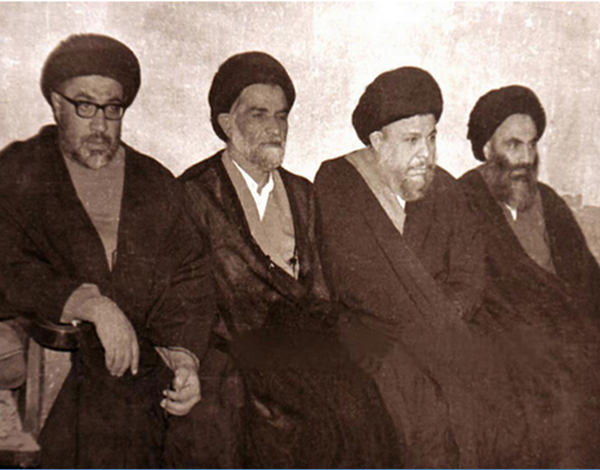 Sayyed al-Khoei challenged them to a debate, claiming that they would not find anyone more knowledgeable in any field than al-Sadr. “Aask him about mathematics, geography, philosophy, history…, any field in which you possess expertise,” al-Khoei said. He added, “If you think you have mastery over social sciences, such as economics, politics, psychology, or any other field, bring them on the table. You will realize the true command and mastery which al-Sadr has over all these fields!”
Sayyed al-Khoei challenged them to a debate, claiming that they would not find anyone more knowledgeable in any field than al-Sadr. “Aask him about mathematics, geography, philosophy, history…, any field in which you possess expertise,” al-Khoei said. He added, “If you think you have mastery over social sciences, such as economics, politics, psychology, or any other field, bring them on the table. You will realize the true command and mastery which al-Sadr has over all these fields!”
Personality
If we want to talk about Ayatollah Sayyed Muhammad-Baqir al-Sadr’s personality, we could very easily say that he was, without any doubt, a genius by all standards. He was ahead of his time! If in the worldly sense we call Einstein a genius, or before him it is said that Leonardo Da Vinci was a genius, we could likewise and very easily say with the complete consensus of religious scholars that Martyr al-Sadr was a man who was way ahead of his time.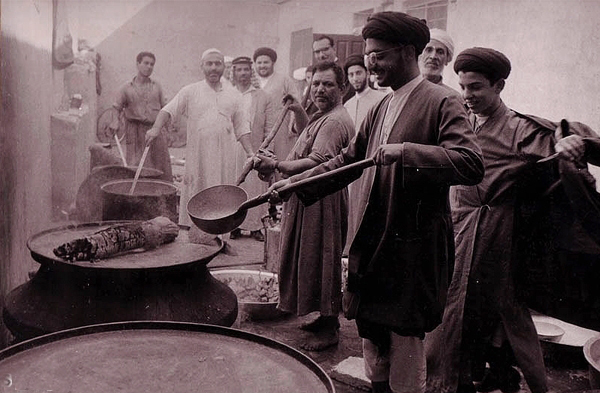 Martyr al-Sadr lived for only 45 years, which according to the average life span of our scholars (ulama) is a very short period of time. In 45 years, anyone studying Islam is still considered “young”. But in these 45 short years, Martyr al-Sadr revolutionized the academic and political aspects of his society in a way that very few could do. Very rarely do personalities such as Martyr al-Sadr’s appear in history. Rarely does anyone have such an impact in such a short period of time, at such a young age, and at a time that was one of the worst in the history of Islam in general and of Iraq in particular.
Martyr al-Sadr lived for only 45 years, which according to the average life span of our scholars (ulama) is a very short period of time. In 45 years, anyone studying Islam is still considered “young”. But in these 45 short years, Martyr al-Sadr revolutionized the academic and political aspects of his society in a way that very few could do. Very rarely do personalities such as Martyr al-Sadr’s appear in history. Rarely does anyone have such an impact in such a short period of time, at such a young age, and at a time that was one of the worst in the history of Islam in general and of Iraq in particular.
Saddam led one of the most brutal and tyrannical reigns in the history of the world. It was in this time that Martyr al-Sadr raised his voice to protest the crimes which this “Butcher of Baghdad”, as Saddam was called by the Iraqis and others, was committing against his own people and against humanity. During such a turbulent and politically charged time period, he established a political process. Establishing a political process requires sacrifice, and the way in which Martyr al-Sadr sacrificed, the way in which he did his work, in an environment where there was no energy for it, no strength for it – he rose up in that environment and tried to lift a nation from zero. He did that all alone with exceptional bravery. In his personality, everything was amazingly impressive, especially in the sense that he was doing all these activities at the level of a Marji` Taqleed . Being at that level and occupying such a position, he sacrificed in a way that, when he was put under house arrest, there was no food at his house at times.
The Study Circles
So let us now begin to talk of Martyr al-Sadr’s intellectual works. Martyr al-Sadr’s method of working on a topic was that he would never use a pattern or foundation built by someone else; everything has to be original with his own stamp on it. If you study any of his works, you will realize that he has never worked on a foundation built by others before him. 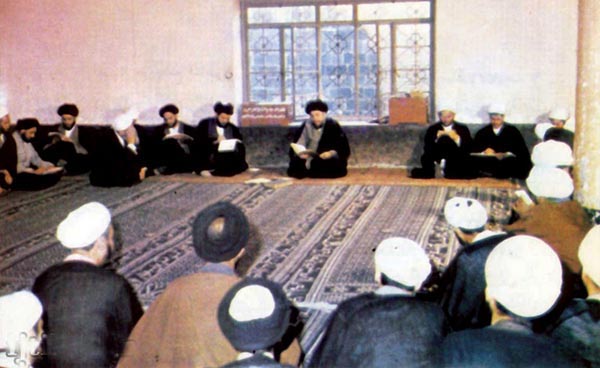 Let us look at his works in the principles of jurisprudence (Ilm al-Usul). This is one of the most fundamental subjects taught to the students of the seminary (hawza) in which they learn how to derive laws. He wrote a book in this field called Halaqaat al-Usool. The reason why he wrote this book was that the syllabus for `Ilm al-Usul, the science of these principles, was quite academic and scholarly.
Let us look at his works in the principles of jurisprudence (Ilm al-Usul). This is one of the most fundamental subjects taught to the students of the seminary (hawza) in which they learn how to derive laws. He wrote a book in this field called Halaqaat al-Usool. The reason why he wrote this book was that the syllabus for `Ilm al-Usul, the science of these principles, was quite academic and scholarly. 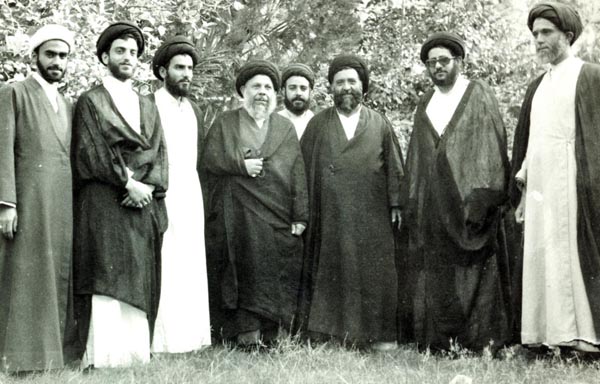 It was like assigning Louis Pasteur’s book to an undergraduate student of chemistry. Instead, Martyr al-Sadr really simplified this field. Even nowadays, this book is used in the seminaries of Najaf, Iraq, and Qum, Iran.
It was like assigning Louis Pasteur’s book to an undergraduate student of chemistry. Instead, Martyr al-Sadr really simplified this field. Even nowadays, this book is used in the seminaries of Najaf, Iraq, and Qum, Iran.
Our Economy and Our Philosophy
Martyr al-Sadr’s academic achievements came at a time when the hawza was weak in the eyes of the world. Communism was at its peak in Iraq. In his book Iqtisaduna (Our Economy, i.e. Islamic economics), Martyr al-Sadr refers to Communist and socialist philosophers, comparing their ideologies, pointing out their points of strength and weakness, all in an academic and scholarly way. Some books were such they were available in Russian and Arabic only. There was not even a copy of those books in English. From this, you can imagine at what level the Communists and socialists worked on the Arab society’s mind. There was no fundamental book of Communism and socialism, no matter how profound and deep, without being translated into Arabic.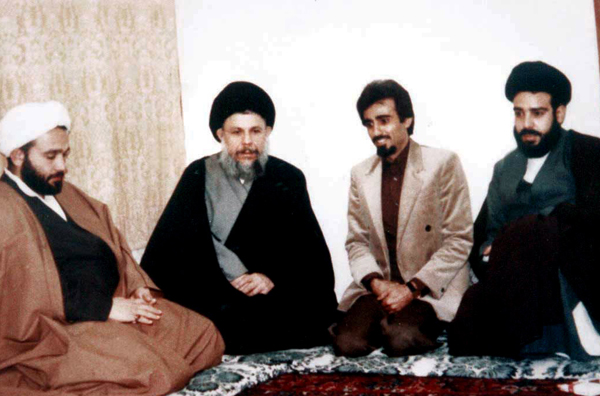
Another evidence of their efforts on the Arab community was that they set up Baath parties in many Arab countries, even though they were not always very organized. Each Baath party worked separately in its respective area. There were branches of the Baath party in Syria, Iraq, Jordan and Lebanon. The word Baath means: to rise, to stand up to perform an action. Obviously, this Baath was for Satan, not for God. The Baath parties were academic in their efforts. They used to present socialism in a great depth, and the people who learned socialism in Iraq learned it extensively and in a great depth.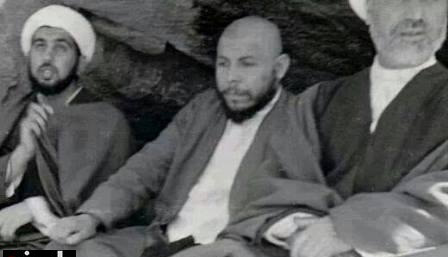
Since the most fundamental and deep books of Communism were translated into Arabic and were in circulation among the general masses, the public would criticize Islam through the lenses of those books. At the time, there were no outstanding scholars in the hawza who could respond to those criticisms and remove the confusion in the young minds. Martyr al-Sadr began his mission here. At the age of 24, he wrote Falsafatuna (Our Philosophy). While studying Falsafatuna , we used to say that this book did not deal with Islamic philosophy at all. It dealt with everything but Islamic philosophy. He chose Our Philosophy as the title for his book, but in reality it was a criticism of the Eastern and Western philosophies. For example, what Communists say in their philosophy, he criticized it. What the Western Capitalists say, he criticized it. What their philosophy tells us, he criticized it. And even in philosophy, he basically touched on one area.
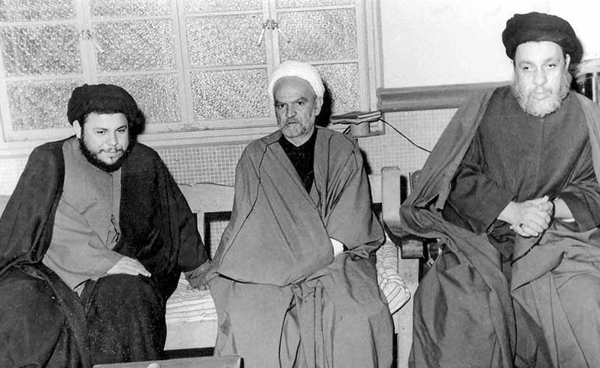
There is one field that has a very important position in philosophy that he presented in a special way; here it is:
The topic of philosophy is what we call Ilm al- Ma`rifa (epistemology or the theory of knowledge). This topic is something that you might say the first topic in philosophy. It is a debate on the question: “How do we know what we see is a reality?” For example, if I look at something and say that its color is black, how can I prove that this thing is, in reality, black? An average observer will say, “Well, that is obvious. You can ‘see’ that it is black.” But the discussion is not whether we can see if a thing is black or not. The discussion is on how we prove that what we are seeing is correctly identified. This is where we get into the topic of `Ilm al-Ma`rifa, the debate on how to prove what we know and what we have learned to be valid. That is, is this knowledge correct or incorrect? There are many thoughts and arguments on this which philosophers have written about and debated. Their main focus was to prove that the human mind is not capable of understanding reality. Even if people understand something, it is subjective knowledge which cannot be proven in an objective way. That is what they wanted. Why? If you prove that God exists and they cannot refute your argument, they will say, “You believe in God because you are a Muslim, and that is why you make such argument.” In response, they will say that God does not exist. And you cannot refute that because all knowledge is subjective. Such a skeptic view becomes possible once they are able to devalue the possibility of verifying objective knowledge. Martyr al-Sadr, Martyr Mutahhari, and `allama Hussain Tabatabai and their likes are all philosophers known as Realists. Their job was to prove that what a human mind knows is reality. There is an in-depth discussion on this in Our Philosophy. The works of scholars of socialism and Communism, even those of Chinese socialists like Mao Zedong, are included, studied and ultimately proven wrong in Our Philosophy.
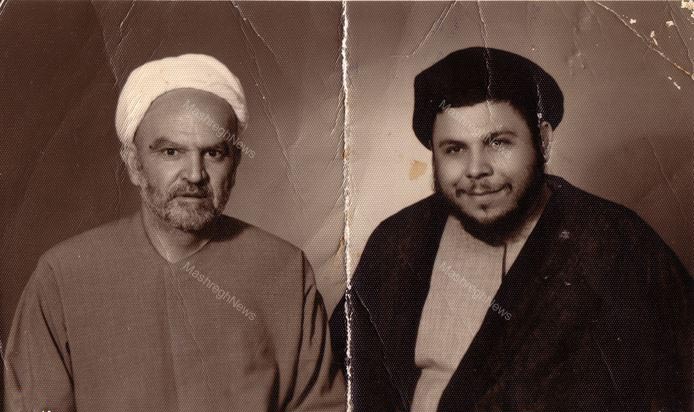
Now, let us consider his other book, Our Economy. In it, he talks about Islamic economics. If you were to go anywhere in the world and ask anyone, Shi`a, Sunni, Muslim, or non-Muslim, about the best book on Islamic economics – it has now been more than a third of a century since the martyrdom of this great man, but without any doubt or hesitation, those who answer your question will say that there is no book like Our Economy. When the curriculum of the Islamic economics department of the Islamic University in Islamabad, Pakistan, was being designed, an Egyptian scholar suggested using Our Economy as its basis. When Saudi scholars immediately rejected the suggestion of using a book written by a Shi`a scholar, the Egyptian man challenged them to suggest another book for the curriculum on its same level. There was no other book that could be presented as an alternative. This proves the fact that when Martyr al-Sadr wrote Our Economy, there was not even a single book on the topic of Islamic economics with comparable caliber! Our Economy is a wonderful book. Martyr al-Sadr first tried to dismantle socialist economics. In doing so, he had to discuss socialist philosophy, more specifically the aspect known as Dialectic Materialism. Socialism had constructed five stages of the human history: When humans first appeared, they had a certain type of economic system, then it changed into agriculture, then capitalism, and now is the time for socialism, while the next stage will be that of communism. They argued saying that this was inevitable. The main point here was Dialectic Materialism.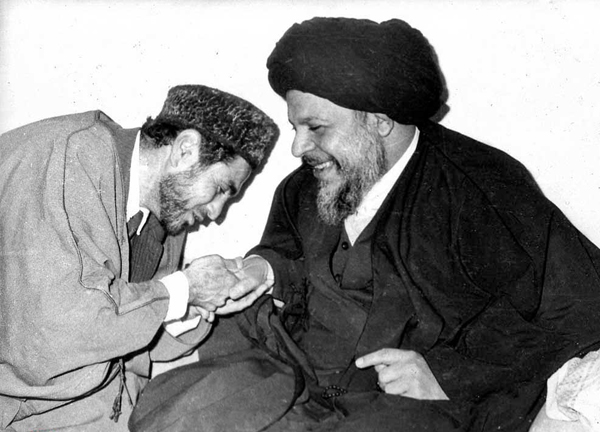
Martyr al-Sadr wrote exhaustive comments on each and every aspect of this philosophy. He commented on both Dialectic Materialism and Determinism. He would always start by explaining what the people opposing him were saying. First, he would describe socialism from the point of view of its proponents. If they are talking about Dialectic Materialism, he will talk about what it really means and its true interpretation, so much so that a student of Martyr al-Sadr told me once that the socialists of Iraq took material from Martyr al-Sadr’s description of socialist thought and printed a separate book on it. They would give that book to other socialists to learn socialism from, since it was best explained there!
Martyr al-Sadr would build up socialism so strongly. When he begins countering those arguments, he shreds them into bits and pieces. That is the beauty of this book. Another interesting point about Martyr al-Sadr’s Our Economy is that in the beginning, he said that there are two ways to attain true knowledge of Islamic economics. We will have to adopt one of the two paths. We can come up with the theory, and when God grants us the opportunity, we will put it into practice – at that time, the Islamic republic had not been established. So he said, let us come up with the theory (`ilm ), and when All ā h permits, we will implement it. The other way is to wait and see if perhaps God would grant us a government. Then we would implement these principles one by one according to Islam. If we do so, in about 50-60 years we will have had a complete system. All ā h granted his second wish: a government was established (through the founding of the Islamic Republic of Iran) where slowly, one by one, these economic principles are being implemented. Some people criticize asking, “Why has the Islamic economic system not been established, even 30 years later?” The answer is this: A system like these does not come about and mature in 25 – 30 years. Capitalism struggled for 200 years before it took the form of a system. We will have to give this system time and offer many sacrifices in its way in order to even partially establish the true Islamic economic system.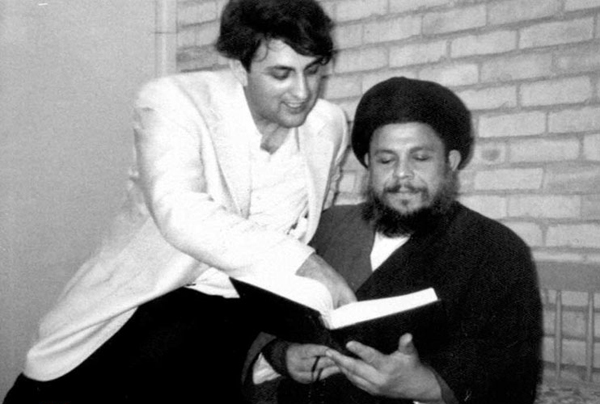
Another book which Martyr al-Sadr wrote on Islamic economics is called Al-Bank al- la Rabbawi Fil Islam (interest-free Islamic Banking). The story of that book is as follows: The government of Kuwait realized that the money people were getting from profits made from the oil industry was being invested for interest. Being Muslims, the investors wanted to find a way to avoid paying or earning interest. In order to address this issue, they organized a conference of Muslim scholars to which Martyr al-Sadr was invited, as were many Saudi scholars. The Saudi scholars did their best to stop Martyr al-Sadr from attending. As a result, the invitation given to Martyr al-Sadr was revoked. Martyr al-Sadr was disappointed, but he wrote a book and sent it to the organizers of the conference. The prejudiced and close-minded Saudis managed to stop Martyr al-Sadr from coming, but they could not stop the book from reaching the conference. When the book was reviewed during the conference, there was no book that came even closely to its caliber. 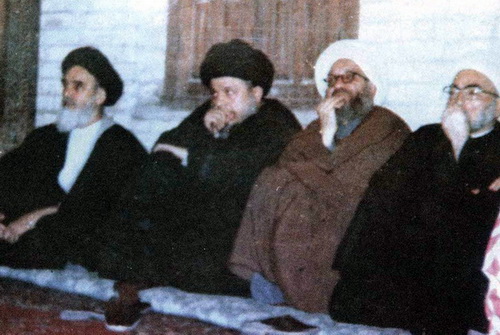 The whole conference had to acknowledge that the author should have been present during the conference. Such was his personality! He made up his mind to work on a new concept, so he wrote a book about it with an entirely new approach. Now just imagine: This man was in Najaf without having any access to banks. He had no access to any international bank. He, therefore, should not have had any insight in the world’s banking system, yet he wrote a book on banking, taking up a unique and complex topic, and now the world is baffled at his genius.
The whole conference had to acknowledge that the author should have been present during the conference. Such was his personality! He made up his mind to work on a new concept, so he wrote a book about it with an entirely new approach. Now just imagine: This man was in Najaf without having any access to banks. He had no access to any international bank. He, therefore, should not have had any insight in the world’s banking system, yet he wrote a book on banking, taking up a unique and complex topic, and now the world is baffled at his genius.
Social and Political Activism
Martyr al-Sadr was one of those scholars who did not limit themselves to the field of knowledge exclusively. He considered himself responsible for the lives of his fellow citizens and humans at large. He, therefore, took upon himself to shoulder the responsibilities of his society. He had to face the system of tyrant Saddam. Sayyid Kamal al-Haidari said that he went to meet Martyr al-Sadr when the latter was under house arrest. He would give only a few people the permission to meet him. Martyr al-Sadr told Kamal al-Haideri that he was ready to offer his ultimate sacrifice, but it would bear no fruit in this land (at the time). Iraq would not rise up. Everyone knew that Martyr al-Sadr had the intention to sacrifice himself for the cause. Sayyid Kamal said that Martyr al-Sadr summed up his intentions to him in one strange sentence: “Every nation requires a Hussain [a reference to the sacrifice of Imam al-Hussain at Kerbala] for the revolution to come.” Every nation has to shed its pure blood just as al-Hussain had done. It would have to offer sacrifices. He agreed to be the Hussain of his era. He knew that his countrymen would not rise immediately, but their children would do so thereafter. His blood would then bear fruit, and so it happened!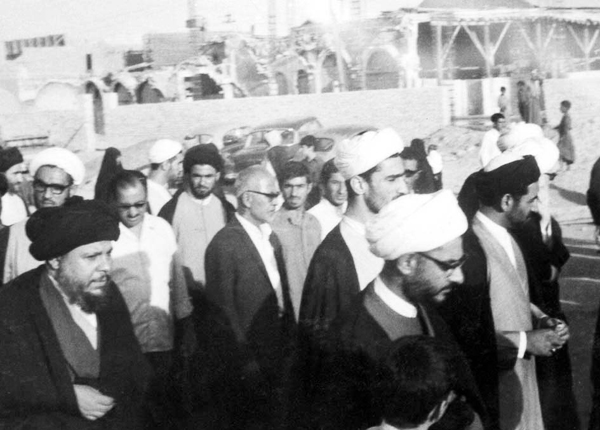
Martyr al-Sadr knew that his blood would not be spilled in vain. He would offer himself as a sacrifice and slowly but surely, the youth will wake up and rise. Those youth will grow old. During the years from 1987-89, eight years after his martyrdom, Iraqi youths were starting to wake up from their slumber of apathy. At that time, the youths’ consciousness and sense of self-respect was only starting to wake up. People who worked with Martyr al-Sadr realized then what a great loss they had suffered by losing him. Martyr al-Sadr was a man of action. The Islamic Da`wa Party (Hizb ud-Da`wa al-Islamiyya), the group with which he was associated, had been established before him. It was created in 1957 by some very notable and pious people. Martyr al-Sadr started giving his full support to it, trying his best to make it intellectually strong. This took place around the year 1968 when he actually joined its ranks. While working for the Islamic Da`wa Party, he used to publish a magazine called Al-Risalat al-Islamiyya (the Message of Islam). In a very short time, that magazine was banned. The articles that he wrote for that magazine were compiled and published as a book called Risalatuna (Our Message).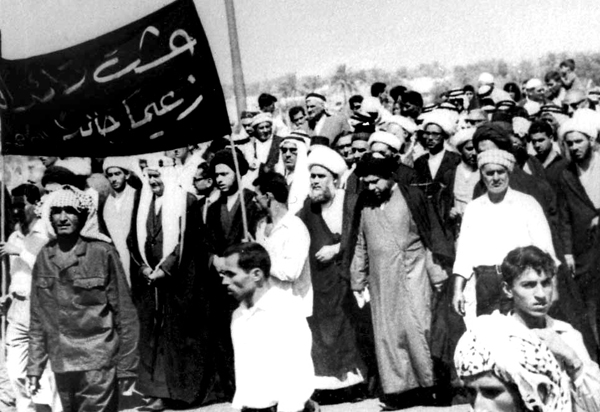
This book discusses social work or activism, that is, how we are supposed to continue our societal efforts, how we should work in our societies, what methods we should use, what was done in various societies when Shi`ism went there, how those efforts were continued…, etc. It is a very good book for one who wants to look at some of the fundamental principles of how to do work for the society. He analyzed the basic aspects of Shi`ism and laid out certain goals for the communities to work on.
Martyrdom
In February of 1980, Martyr al-Sadr was taken to prison for the last time. It was decided that he should be killed along with Bint al-Huda. There were things that happened to the women in the prisons that nobody can even describe because it would be too shameful and embarrassing. Not one or two cases, tens of thousands of cases were there. By God, the true nature of Saddam’s atrocities has not been revealed to the world yet even after the passage of all these years as well as the nature of those who brought him to power and who supported him with all their might and means. Bint al-Huda was taken with Martyr al-Sadr to such a prison. Saddam issued orders to have both of them killed. Someone very close to Saddam asked him to kill Ayatollah Muhammed-Baqir al-Sadr but spare Bint al-Huda. Saddam said, “Should I kill the brother and let his sister live?! Should I make the same blunder which Yazid [son of Mu`awiya son of Abu Sufyan, who killed Imam al-Hussain; refer to a footnote above] did?!”
Muhammad al-Tijani al Samawi Meeting with Ayatollah Sayyid Muhammad Baqir al-Sadr
Martyr Sadr’s Published Books with Download Links:
Iqtisaduna [Our Economics] Vol. 01 Part I
Iqtisaduna [Our Economics] Vol. 01 Part II
Iqtisaduna [Our Economics] Vol. 02 Part I
Iqtisaduna [Our Economics] Vol. 02 Part II
What Do You Know About Islamic Economics?
Islam and Schools of Economics
Lessons in Islamic jurisprudence
The Renewal of Islamic Law: Muhammad Baqer as-Sadr, Najaf and the Shi’i International
A Short History of ‘Ilm’ul Usul
A Study in the Philosophy of the Islamic Rites
An Inquiry Concerning Al-Mahdi
Contemporary Man and the Social Problem
The Revealer (Al-Mursil), The Messenger (Ar-Rasul), The Message (Ar-Risalah)
Critique_of_Marxist_Philosophy, Part 1
Critique of Marxist Philosophy, Part 2
The Emergence of Shi’ism and the Shi’ites
Logical Foundations of Induction
Principles of Islamic jurisprudence : according to Shi’i law
Notable Colleagues and Students:
- Muhammad Hussein Fadlullah
- Muhammad Baqir al-Hakim (Late)
- Muhammad Muhammad Sadiq as-Sadr
- Mohsen Araki
- Kazem al-Haeri
- Abbas al-Musawi
- Talib Jauhari
- Sajid Ali Naqvi
- Ali El-Amine
- Sayyed Zeeshan Haider Jawadi
 Ijtihad Network Being Wise and Faithful Muslim in the Contemporary World
Ijtihad Network Being Wise and Faithful Muslim in the Contemporary World
